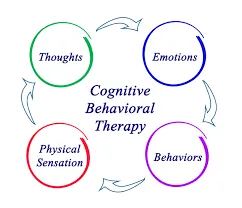Being Okay With Yourself and Your Body During The Holiday Season
.webp)
By: Rich Belz, Ph.D. and Fugen Neziroglu, Ph.D., ABBP, ABPP
Around the holidays, many people come together to celebrate friendship, family, and togetherness. For some people, however, it can be hard to enjoy the holidays for a variety of reasons; including dealing with difficult family members, feeling pressured to spend more time with one family member over another, feeling isolated, feeling uncomfortable with your own appearance, feeling uncomfortable with how you present to others, or in general being around food, a staple of the holiday season. It seems a lot of people struggle with their body image around this time. Overall, there is a tendency to indulge in food, its expected, food is everywhere, we exchange food as a way to say thank you for all of you have done throughout the year. Displays of candies, cookies, gift baskets are all calling out to you. What a temptation! If you struggle with your weight, body image, or eating habits – including anorexia, bulimia or binge eating – it is a particularly a hard season, as there are more triggers and expectations around food during these two months. In this article we will discuss five tips to help reduce this distress and better navigate situations you may find yourself in this time of year.
Setting boundaries: Don’t let Others Influence Your Body Worth
Having a strategy for engaging with friends and family about body image or eating can be a helpful tool. Telling them that comments on your body weight or appearance make you uncomfortable or feel unsupported can gently bring awareness to your experience. If someone makes you feel bad for expressing your boundaries, think about the place you’re coming from. Pause and think about what you are thinking at the moment. Change the focus from whether the other person is trying to make you feel bad or appears to have good intentions. This is not about making someone else feel bad or that they “can’t speak freely” – this is you practicing self-respect and manifesting a positive environment for yourself and others. If someone does comment on your body, you can pause and take a moment so negative thoughts don’t take over. You can think, “I am not defined by the comments of others” and “I can be present in the moment and have the ability to engage in another topic or leave this conversation”. You have the choice to say no and not engage in the conversation. If you feel pressured to continue the topic, you can think about your commitment to doing what is right for yourself and use that as encouragement to leave the discussion. If you have an eating disorder, of course work on it and set up goals for change for yourself, not because of what others are saying or thinking.
Being Open to Experience: There are no Good and Bad Foods
Since food is often a highlight of the holiday season, two things that may come up: thoughts to restrict eating, or thoughts of over-eating. It can be important to not assign a value judgment to food - this food is “good” and this food is “bad” can quickly become “I am good if I eat this thing” or “I did a bad thing if I eat this thing”. Being happy and experiencing pleasure is a reasonable want to get out of life, and food is one aspect of that experience. You can connect your thoughts and actions to this value by thinking, “I am allowed to be happy by eating this. What I eat does not define my worth.” For those with body image concerns or eating disorders, food and emotion can be tied together. Individuals with anorexia, for example, can view food restriction as an element of weight control and feeling good about themselves, having thoughts such as, “If I don’t eat this then I will be thin”. Suppressing and ruminating on unwanted emotions can also lead to binge eating behavior, which the individual then feels guilty about engaging in, potentially perpetuating an emotion-fueled cycle of behavior. Recognizing the interplay of thoughts and emotions with behavior can be helpful to manage food situations during the holidays, as seeing the parts that make the whole can bring clarity to individual thoughts, emotions, and behaviors in context of the wider picture. Following the previous example, if you have the thought “If I don’t eat this then I will be thin”, you can connect this to the behavior of restricting food intake and to other possible thoughts, such as “Being thin is how I feel loved and accepted”. You may think, “Is there another way to live my value of being loved and accepted by others?” and think of alternatives. Taking a step back this way and seeing food more neutrally can help make being around food and eating easier. Establishing expectations around food before eating can help with feelings of guilt or desire to restrict what you’re eating. During or after eating you can notice sensations that arise around food and any thoughts that come up. For example, if you think, “I’m garbage for eating this” you can pause, think about how plenty of people eat this food in general or around the holidays, and even if no one else was eating it how you have the right to enjoy yourself. If you find yourself thinking, “I’m eating a lot of food”, pause and take a moment to think about that. What does “a lot of food” mean to you? If you and others would agree that the amount of food being eaten is a lot, go easy on yourself and look for a balance between enjoying the season – as people often eat more during this time of year – and the expectations you have on yourself for how much or how little food you tend to eat. Keeping moderation in mind throughout the holiday season can help temper anxiety by visualizing yourself enjoying the food and allowing yourself to go in for more food if you are still hungry or stop if you are feeling full. This is another way to allow yourself to feel joy and positively experience the spirit of the season.
Setting Boundaries with Yourself: Limit Social Comparisons
With more down time during the holidays, people often find themselves scrolling through social media. Many images can be potentially triggering, drawing comparisons to others who are in ads or seeing posts from friends. Two things you can do are: decrease social media usage and use social media with a plan in place. Turning your phone off or uninstalling social media apps is one route of decreasing their use. You can also make your screen black and white instead of in color, which has been shown to reduce the amount of time people spend on social media. Before using social media, you can consider the pros and cons of doing so at this time of year and have a plan in case you see something distressing. If you see something distressing, you may initially feel bad about yourself for using the app or comparing yourself to others. Allow the feeling to exist, not pushing it away, and letting it fade. If it does not fade, or if you see something that triggers a bunch of negative thoughts about yourself, try to pause and separate yourself from those thoughts. Imagine yourself sitting on the couch with your phone in your hand, and see that you and your thoughts are separate things. You exist outside of the thoughts in your mind. You can visualize yourself engaging in a different activity, such as getting up to see if anyone needs help decorating or cooking, or see if there’s a group activity nearby, and then engage in that activity.
Choosing Engagement over Isolation
It can be tempting to withdraw during the holidays and not see anyone. If you are thinking about not going to holiday events, that is certainly your right. You should not have to do anything you do not want to do. Having alone time and the ability to decompress at your leisure is important. But you can think about whether going or not going serves your values or conflicts with them. Think about the reasons for not attending and if you would miss out on anything if you didn’t go. If you value being involved in a certain tradition or every time you see a certain family member, they make you laugh, then try to lean into those values to encourage you to go. And remember that you always have an exit strategy just in case. On the other hand, if you feel isolated try to join social activities, initiate having others over, ask a neighbor or a family member to get coffee. There are a lot of Meet Ups during this season.
Finding Joy
Lastly, it is important to remember that the holidays are a time to enjoy yourself and, if it brings you joy, to spend time with others. Remind yourself you deserve to experience happiness, and that practicing these strategies can help. We hope these tips will help you during and after the holiday season. Please reach out to us for more support or if you would like to further develop these skills with us. In summary, learn to live your valued life, learn to let go of negative thoughts, stay in the moment, don’t avoid, be a participant in life.
More Blog Posts

Clarifying Your Values After Starting Recovery

Enjoying the Flowers
.webp)
Positive Clinical Psychology - Part III

You can experience life again. Let’s take steps together.
At Bio Behavioral Institute, we’re here to be your team and get you back to the life you deserve. Schedule your consultation and take the first step towards a more meaningful life.
Call our office at 516-487-7116 or complete the form to schedule your consultation.
